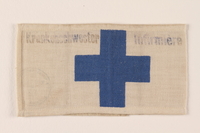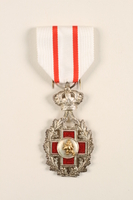Overview
- Description
- Consists of official documents, correspondence, identity cards, and photographs related to Menia Awret-Back's work as a baby nurse in wartime Brussels, Belgium. Mrs. Awret-Back, who was Jewish, was saved from deportation at the behest of the various charitable agencies for which she worked. Includes her identity paperwork as a nurse, a Red Cross armband with a blue cross (as she was Jewish), photographs of the children in the orphanage in which she worked, and copies of the correspondence asking for her continued freedom. Also includes wartime letters to her husband, Isaac Back, who was interned in a series of Belgian and French internment camps.
- Date
-
1930-1949
- Credit Line
- United States Holocaust Memorial Museum Collection, Gift of Serge Back
Physical Details
- Extent
-
1 folder
Rights & Restrictions
- Conditions on Access
- There are no known restrictions on access to this material.
- Conditions on Use
- Material(s) in this collection may be protected by copyright and/or related rights. You do not require further permission from the Museum to use this material. The user is solely responsible for making a determination as to if and how the material may be used.
Administrative Notes
- Holder of Originals
-
United States Holocaust Memorial Museum
- Legal Status
- Permanent Collection
- Provenance
- Serge Back donated his mother's collection to the United States Holocaust Memorial Museum on June 13, 2007.
- Record last modified:
- 2023-02-24 14:18:17
- This page:
- https://collections.ushmm.org/search/catalog/irn519009
Download & Licensing
- In Copyright - Use Permitted
- Terms of Use
- This record is not digitized and cannot be downloaded online.
In-Person Research
- Request 7 Days in Advance of Visit
- Plan a Research Visit
-
Request in Shapell Center Reading Room
Bowie, MD
Contact Us
Also in Menia Awret-Back collection
The collection consists of an armband, a medal, correspondence, documents, and photographs relating to the experiences of Menia Awret-Back as a pediatric nurse for several charitable organizations in Poland and Belgium before, during, and after the Holocaust.
Date: 1930-1949

Blue cross armband worn by a Jewish Russian nurse caring for refugee children
Object
Blue cross armband worn by Menia Awret-Back, while working as a nurse for Jewish refugee children during the war in Brussels. Belgium was occupied by Germany in May 1940. Restrictions were placed on Jews to exclude them from society. Jewish children and expectant mothers were not allowed to be treated in existing facilities. Menia, as a Jewish nurse, had to wear an armband with a blue cross in place of the usual red cross. Since 1938, Menia had worked for L'Ouevre Nationale de L'Enfance [National Children's Aid] and the Belgium Red Cross, which now established and staffed special treatment centers for Jewish patients. In summer 1940, the German began deporting non-Belgian Jews, which put Menia at risk because she held a Russian passport. The charitable agencies for which she worked successfully requested that she be allowed to remain because of the importance of her work. The Swedish Consulate wrote letters stating that she was a holder of a valid Russian passport and that they were placing her under their protection. Menia's husband Isaac was arrested and jailed for anti-Nazi activity in 1941. He and Menia were reunited after the war ended in May 1945.

Belgian Red Cross medal, ribbon, and box awarded to a Jewish Russian nurse
Object
Belgian Red Cross medal 2nd class with ribbon and presentation box awarded to Menia Awret-Back in recognition of her work as a nurse for Jewish refugee children in Brussels, Belgium, during the war. Belgium was occupied by Germany in May 1940. Restrictions were placed on Jews to exclude them from society. Jewish children and expectant mothers were not allowed to be treated in existing facilities. Menia, as a Jewish nurse, had to wear an armband with a blue cross in place of the usual red cross. Since 1938, Menia had worked for L'Ouevre Nationale de L'Enfance [National Children's Aid] and the Belgium Red Cross, which now established and staffed special treatment centers for Jewish patients. In summer 1940, the Germans began deporting non-Belgian Jews, which put Menia at risk because she held a Russian passport. The charitable agencies for which she worked successfully requested that she be allowed to remain because of the importance of her work. The Swedish Consulate wrote letters stating that she was a holder of a valid Russian passport and that they were placing her under their protection. Menia's husband Isaac was arrested and jailed for anti-Nazi activity in 1941. He and Menia were reunited after the war ended in May 1945.



